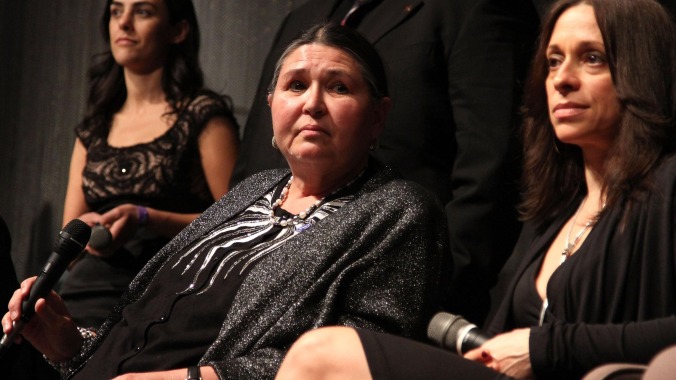Despite being blacklisted, Sacheen Littlefeather says she would give her Oscars speech all over again
The activist and former actor reflects on the historical moment 50 years later

With her 60-second Oscar speech in 1973, Indigenous actor Sacheen Littlefeather made history. As the first Native American woman to stand on the Academy Award stage, she refused to accept Marlon Brando’s award for his performance in The Godfather on his behalf and stood up for her suffering community.
“He very regretfully cannot accept this very generous award,” Littlefeather said in her speech. “And the reasons for this being are the treatment of American Indians today by the film industry… and on television in movie re-runs, and also with recent happenings at Wounded Knee.”
This action would not only incur the wrath of John Wayne, the FBI, and the general public, but help end the media blackout on Wounded Knee against the American Indian Movement. In a new interview with Variety, Littlefeather reflects on the moment all these years later and its tangible effects on the Indigenous community and her career.
“As I walked off that stage, I did in the ways of courage, honor, grace, dignity and truthfulness,” Littlefeather says. “I did so in the ways of my ancestors and the ways of Indigenous women. I was met with the stereotypical tomahawk chop, individuals who called at me, and I ignored all of them. I continued to walk straight ahead with a couple of armed guards beside me, and I held my head high and was proud to be the first Indigenous woman in the history of the Academy Awards to make that political statement.”
While the boos heard during her speech would eventually fade away, Littlefeather says the FBI worked hard to ensure the end of her acting career.
“Way back then, when I did that, I was boycotted by the FBI. They went around Hollywood and told people not to hire me,” Littlefeather says of the aftermath. “If they did, they would shut their film production down. In addition, other people were let on talk shows like Johnny Carson, Merv Griffin, and other popular talk shows. They could go on there and talk about me, but I was never allowed to go on them and represent myself.”
In spite of all of this, Littlefeather says she would do it over again “in a heartbeat.”
“I did not do this totally for Marlon,” Littlefeather says. “I did not do this on my behalf. I did this for all Native people everywhere who suffered from racial prejudice and discrimination. I did it for all of those who were born under the umbrella of genocide, in the United States, and Canada, and for all of us who have suffered through extreme stereotypes which were not of our choosing.”
Nearly 50 years after Littlefeather’s speech, she received an official apology from the Academy of Motion Picture Arts and Sciences. This weekend, the Academy will host a “very special program of conversation, reflection, healing and celebration,” titled An Evening With Sacheen Littlefeather.